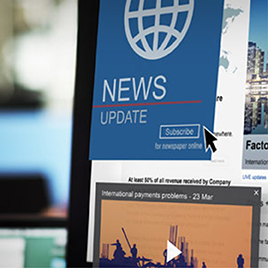
Jamie Dalton | June 19, 2023
First of all, congratulations! If you were approached about an interview, it means you have something interesting and newsworthy to share. Media interviews can cause a lot of anxiety, knowing your words will be out there, broadcast, printed or put online for the world to see. But you can overcome your angst if you know how to prepare for a media interview.
Start with the subject
What’s the first step to prepping for a conversation with a reporter? If you go through media interview training, you’ll learn that the first step is to make sure you know the subject of your interview. This might sound silly, but there is often a misperception between interviewer and interviewee as to exactly what the interview is about.
When the reporter requested the interview, they may have said they wanted to talk to you about zebras. But, what, specifically, do they want to know … What is the current zebra population in northern Kenya? Why do they have stripes? Or… Is the zebra population diminishing, and does your company have a small part in that shrinking number?
If you are not completely clear on the direction of the article or the reporter’s intended line of questioning, it’s perfectly okay to ask for clarification. It can only help both of you to have a better sense of what will be asked during the interview. If the reporter hesitates to provide you with a list of the questions they plan to ask, you can put them at ease by letting them know you’re only asking so that you can be sure you’re prepared to give them the information they need.
Do your homework
Next: research, research, research. Research the reporter who requested the interview. What types of stories do they typically write? Have they covered the topic at hand in the past? What is their tone … is it very serious and fact-based, or more lighthearted? This will help you get to know the reporter before your conversation. If they are a freelancer, what types of publications do they typically write for? Do they use social media as a tool to promote their work or engage with readers and followers? If so, check out their Facebook, Twitter, Instagram or LinkedIn account(s) to get a feel for their interests, opinions and unique approaches to their subject matter.
Agree on the format
If the reporter works for a television station, they likely will want to get video of you by interviewing you on camera and in person, or possibly via Zoom. A radio or podcast reporter may want you to come to their studio. With any of these types of interviews, ask if the interview will be live or recorded to air later.
If the interview is not being conducted in person, you may have a choice between phone or email. If this is the case, consider the following:
- Phone interviews enable you to more easily convey your passion and excitement surrounding a given topic by the tone of your voice. These interviews are best when you are completely comfortable with the subject matter. They are also useful if your subject matter requires detailed explanation or education. Phone interviews may not be ideal if you tend to go off-topic from time to time (trust me, we all do) or easily lose your train of thought … Wait, what was I talking about? Oh, yes, phone versus email interviews.
- Email interviews are best if you need to convey simple, factual information. They are also good if you are not as comfortable with your material or if it could be contentious, as they allow you to re-read and review your answers before sending to the reporter. Potential pitfalls of the email interview include having limited space to convey your points and, if there are multiple interviewees, receiving fewer column inches than someone who made a connection with the reporter during a phone interview.
Prepare your answers
Next, if the reporter told you their questions, great! But even if they didn’t, put yourself in their shoes and try to anticipate all the questions they may ask and decide how you’d like to answer them. Tap into a co-worker or friend who isn’t as close to the subject and see if they have additional questions that may not have occurred to you. Practice answering them out loud. Be prepared for the reporter to inquire about items that you can’t answer on the spot. When this happens, it’s okay to respond with a simple “Let me get back to you.”
Develop your key messages
One of the most important media training tips is to determine ahead of time what you’d like to see included in the story. Of course you want to help the reporter get the information they need, but you can also use the interview as an opportunity to communicate something that’s important to you, too.
For example, does the topic of the story give you an opportunity to talk about your company’s latest widget? If so, what makes your widget unique and how does it benefit the end user? Boil that down into a few key messages (no more than three!) that that convey the information in a non-promotional and informative way, and then weave those messages into the conversation. Deliver your key messages in the spirit of educating the audience and giving them information that will help them. Be careful not to make it sound like a sales pitch.
Offer to be a resource
Be ready to provide additional materials that may help the reporter with their story, such as published research, links to additional information, photos, videos or referrals to other subject matter experts. By setting yourself up as a valuable resource that knows media relations best practices, you may be able to score a spot in the reporter’s permanent contact list.
Now, take a deep breath, and call (or email) that reporter back. You can do this!
Ready to refine your PR and media interview game? Contact Falls & Co. and let’s explore the possibilities.
More Related Content:
- Your Public Relations Strategy Questions Answered
- How to Best Work with an Agency
- Set Goals to Measure a PR Program
- How to Get Media Attention for your Business by Leveraging Existing Coverage
- Is Corporate Storytelling More Art or Science?
- How to Get Media Coverage at Trade Shows, Conferences
- How to Make News if There’s Nothing New to Say
- Corporate Crisis Management Demands Quick Response


